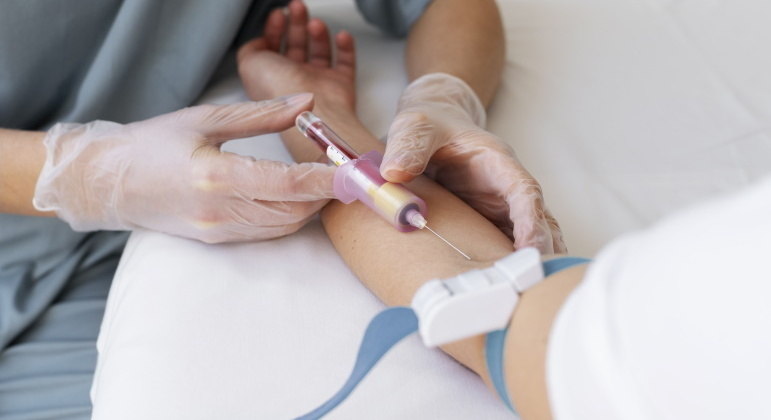Have you ever heard the phrase “the gut is our second brain”? Without exaggeration, the connection occurs between these two parts of the human body which is fundamental to maintaining our health.
“Both organs, the brain and the intestine, have a common embryonic origin, are born from the same cell, so they end up sharing Very intimate contact’.
This connection could be via a nerve or blood, for example. But what is certain is that when it is changed, it will cause changes in human health.
Weight loss
Estima Nutrição dietitian, who specializes in clinical sports nutrition and health monitoring, Edvânia Soares, says the intestines are responsible for producing neurotransmitters (which transmit information to cells) and hormones that directly affect an individual’s well-being and weight.
“If you have bowel irritation, you have a lot of bowel movements, so you automatically lose weight,” says the expert.
In addition, the decrease in the production of neurotransmitters also indicates the way a person deals with fewer pounds, because when they are “not being produced or balanced, a person may have more malaise”.
This contact [entre cérebro e intestino] It is necessary to control our hunger, satiety, and the production of various intestinal hormones, it directly interferes with our metabolism, making us eat more, eat less, gain weight, and lose weight, says Barbuti.
Vitamin deficiency
The body absorbs in the intestine many nutrients and fats – good and bad. Proteins are absorbed in the stomach, but also pass through the intestines.
Vitamins A, C, E, D, K and B, and some minerals such as iron, calcium, magnesium and zinc are absorbed in the small intestine. When you think about nutritional absorption, we have more disposition, more energy, and more vitality, because it fuels your body, says Edvânia.
Lack of absorption can lead to nutrient deficiencies. This occurs when the intestinal microvilli (enlargement of absorption surfaces) suffers from disturbances that make it difficult to retain nutrients and to digest and excrete fluids, for example.
“When the intestines are not, in a certain way, healthy, we start deficient in nutrients, so they usually have a nutritional deficit, which is normal,” warns the dietitian.
Anemia
For some people, anemia is linked to a poor diet. However, it should be noted that it is caused by several factors and is not a disease, but a symptom, which is a way for the human body to warn about a problem, for example, in the intestines.
Advania tells us, “Gluten interferes with iron absorption, because gluten is a non-solid part of wheat, and when you take, say, a celiac patient and they end up consuming a lot of gluten, they don’t absorb the nutrients.”
He adds: ‘He starts not absorbing iron because he starts not giving that absorption priority, so yes a person can, I’m not just talking about celiac, but someone who has irritation in the gut or not fully absorbed leads to anemia.
Worry
The nutritionist also explains that most serotonin, from 80% to 90%, is produced in the intestines. This is because gut health provides a “feeling of well-being, lightness, and happiness.”
However, when there is any change, it can directly interfere with the mood of the individual. Depression is among the conditions that can develop, as is anxiety.
When one catches a cold, for example, the person also has a bad mood, irritability, nervousness, and anxiety. Our guts are an immune barrier, they are producers of the happiness hormone, and will reduce susceptibility to many diseases, explains Edvânia.
Barbie adds that both conditions occur because “what happens in the gut directly interferes with the function of our brain.”
Parkinson’s disease
Ricardo Barbuti explains that humans live a system known as eubiosis, which is defined as a state of health. When the mixture of microorganisms in the intestine undergoes some change, dysbacteriosis begins.
This instability has negative repercussions in the gut and beyond. “There is a lot of work that shows the direct relationship between what happens in the gut and neurological and psychiatric diseases, such as Parkinson’s disease,” Barbuti says.
A study published in iScience and carried out by Brazilian researchers showed that gut flora (microorganisms that live in the gastrointestinal tract) influence, for example, neurodevelopment.
The scientists found that there was a greater abundance of Akkermansia muciniphila in stool samples from Parkinson’s patients when compared to the control group.
From this, they concluded that gut dysbacteriosis could lead to an increase in these bacteria, contributing to the accumulation of a protein known to be associated with Parkinson’s disease (αSyn), which can subsequently migrate to the central nervous system – a possible means of sporadic Parkinson’s disease onset.
In the face of conditions caused by intestinal changes, it is necessary to pay attention to the signs that something is wrong. The first symptoms, according to Advania, can be flatulence, white tongue, mood swings, swelling and fatigue.
In the case of children, when they begin to turn a lot in bed clockwise and sweat excessively, this is a symptom of food intolerance. Clockwise is how the intestines work, so the baby moves in bed due to inertia.
As for adults, those who sweat excessively at night, move around a lot in bed and have mental confusion, such as forgetting some words, should investigate some food intolerances.
Finally, the nutritionist explains that the Bristol Scale is a way to see if human stool looks correct, because when it starts to crumble and doesn’t end with this little tip, it’s an attention you should have for your gut.
It is always correct to give importance to the signs of this part of the body, because with “you are more nourished, your gut is working, you have more health, well-being, longevity and happiness”.
* Trainee in R7 Under the supervision of Fernando Meles

“Wannabe internet buff. Future teen idol. Hardcore zombie guru. Gamer. Avid creator. Entrepreneur. Bacon ninja.”

